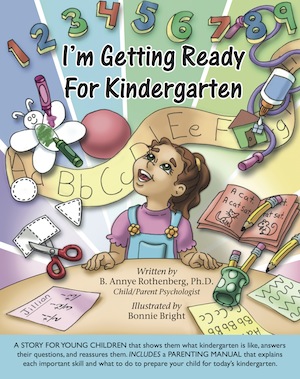|
ABOUT THE BOOK -
EXCERPT FROM THE PARENTING GUIDANCE SECTION
I'm Getting Ready For Kindergarten
 WORKING WITH YOUR CHILD'S KINDERGARTEN TEACHER WORKING WITH YOUR CHILD'S KINDERGARTEN TEACHER
In the early fall, schools hold
back-to-school night, and later in the fall, you get feedback at
your parent-teacher conference. It's
best to establish a partnership with the teacher so our child feels
that both his teacher and his parents know what's going on in his world.
Keep the teacher informed about any stresses at home such as parents
traveling, sickness, death of someone close, etc. Find out the best way
to communicate with the teacher. Many prefer e-mail.
It's common for teachers to notice
areas where our children need some additional help. These could be
academic or behavioral. They may ask us to work with our children in
these areas (such as learning to raise his hand before he talks or
learning more alphabet letters). Occasionally
teachers may feel that despite all your efforts, and theirs, more help
is needed, and may suggest a learning or behavior evaluation. Public
schools can usually provide these assessments at no cost to us (and
private schools can recommend an evaluation specialist). Your child's
pediatrician can also recommend a specialist.
When a teacher feels our child has
a noticeable problem, we can easily get defensive at what sounds like
criticism. We may strongly disagree, blame her for the problems, and
even want to change teachers or schools. Try very hard not to go down
that road. Consider the teacher's recommendations seriously,
understanding that she wants your child – as you do – to have a
successful year. Ask
enough questions so that you know exactly what the problems are and
when they occur. Have you observed what the teacher is talking about?
Arrange an initial conversation with the appropriate specialist to
determine if you want to proceed. Remember, help is more effective when
it starts sooner rather than later. Finally, do not criticize your
child's teacher in any way that your child will overhear. It is
nearly impossible for your child to learn from a teacher you don't
respect, and it will make being at school a negative or at least an
ambivalent experience for him. We shouldn't do that to our kids.
|

